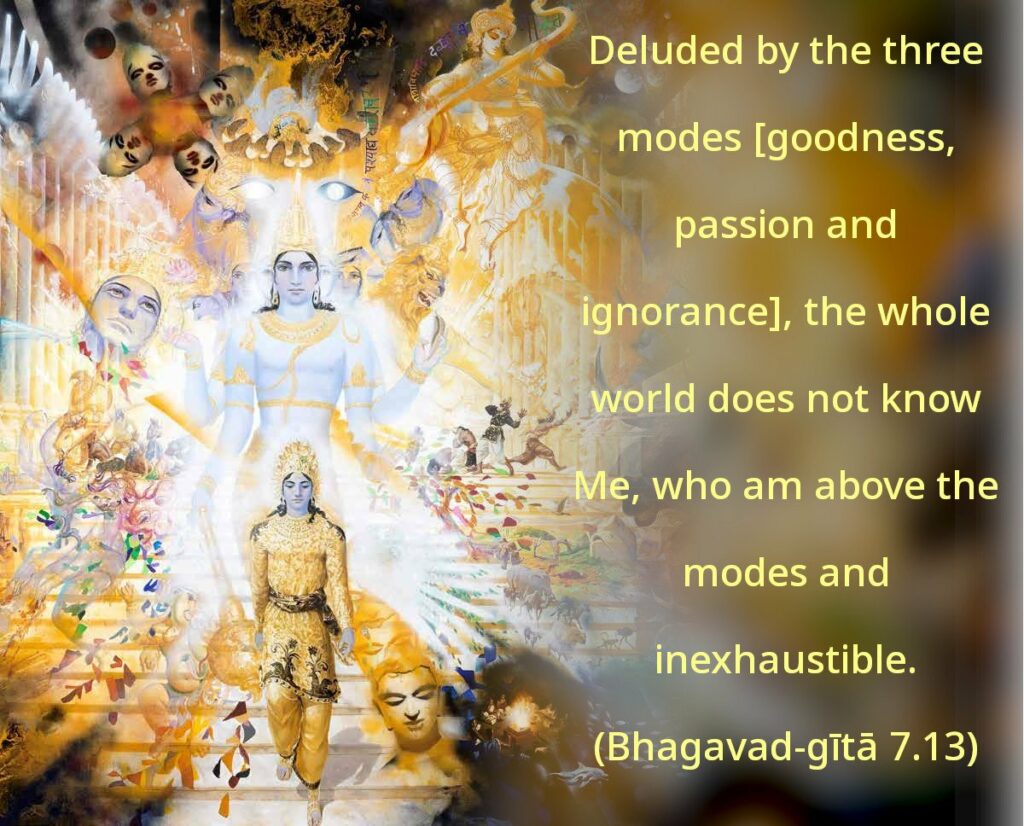त्रिभिर्गुणमयैर्भावैरेभि: सर्वमिदं जगत् |
मोहितं नाभिजानाति मामेभ्य: परमव्ययम् || 13||
tribhir guṇa-mayair bhāvair ebhiḥ sarvam idaṁ jagat
mohitaṁ nābhijānāti māmebhyaḥ param avyayam
tribhiḥ—by three; guṇa-mayaiḥ—consisting of the modes of material nature; bhāvaiḥ—states; ebhiḥ—all these; sarvam—whole; idam—this; jagat—universe; mohitam—deluded; na—not; abhijānāti—know; mām—me; ebhyaḥ—these; param—the supreme; avyayam—imperishable
Translation:
Deluded by nature composed of these three qualities (Sattva, Rajas, and Tamas) the whole world does not know Me, the Higher and Imperishable.
Commentary:
When the clouds spread over the sky one cannot see the Sun, which is above the clouds. Even so, when the mind is deluded by the three qualities, one cannot see Atma, who is transcendental. Enveloped by these qualities, man remains like a worm in a fruit. It can move inside the fruit, but it cannot come out unless the rind is broken. So long as the qualities agitate the mind, the real Self cannot be perceived.
It is necessary first of all to understand the cause of ignorance and know that one is bound. Then only does he make the attempt to regain his freedom. The spiritual aspirant is on a higher plane because he has become conscious of his bondage and is eager to know the truth. This itself is a great step in evolution. The majority of people do not even know that they are slaves to their own lower nature. The aspirant is awakened to his present position as a bound soul, and so he strives to get himself free from the shackles that bind him. Except for the jivanmuktas, all the others – rich and poor, great and small, learned and illiterate – are bound by Maya. The eye cannot see objects when there is a cataract. It should be removed by surgical operation. Then the eye becomes clear and sees things distinctly. Such an operation should be conducted by the spiritual seeker. In this verse, the cause of ignorance is explained. In the next verse, the way to freedom is pointed out.
Sri Ramakrishna Says —
The Master continued: “Bondage and liberation are both of Her making. By Her maya worldly people become entangled in ‘woman and gold’, and again, through Her grace they attain their liberation. She is called the Saviour, and the Remover of the bondage that binds one to the world.”
Then the Master sang the following song in his melodious voice:
In the world’s busy market-place, O Syama, Thou art flying kites;
High up they soar on the wind of hope, held fast by maya’s string.
Their frames are human skeletons, their sails of the three gunas made;
But all their curious workmanship is merely for ornament.
Upon the kite-strings Thou hast rubbed the manja-paste of worldliness,
So as to make each straining strand all the more sharp and strong.
Out of a hundred thousand kites, at best but one or two break free;
And Thou dost laugh and clap Thy hands, O Mother, watching them!
On favouring winds, says Ramprasad, the kites set loose will speedily
Be borne away to the Infinite, across the sea of the world.
The Master said: “The Divine Mother is always playful and sportive. This universe is Her play. She is self-willed and must always have Her own way. She is full of bliss. She gives freedom to one out of a hundred thousand.”
A BRAHMO DEVOTEE: “But, sir, if She likes, She can give freedom to all. Why, then, has She kept us bound to the world?”
MASTER: “That is Her will. She wants to continue playing with Her created beings. In a game of hide-and-seek3 the running about soon stops if in the beginning all the players touch the ‘granny’. If all touch her, then how can the game go on? That displeases her. Her pleasure is in continuing the game. Therefore the poet said:
Out of a hundred thousand kites, at best but one or two break free;
And Thou dost laugh and clap Thy hands, O Mother, watching them!
“It is as if the Divine Mother said to the human mind in confidence, with a sign from Her eye, ‘Go and enjoy the world.’ How can one blame the mind? The mind can disentangle itself from worldliness if, through Her grace, She makes it turn toward Herself. Only then does it become devoted to the Lotus Feet of the Divine Mother.”
…..”I tell you the truth: there is nothing wrong in your being in the world. But you must direct your mind toward God; otherwise you will not succeed.
Do your duty with one hand and with the other hold to God. After the duty is over, you will hold to God with both hands.
“It is all a question of the mind. Bondage and liberation are of the mind alone. The mind will take the colour you dye it with. It is like white clothes just returned from the laundry. If you dip them in red dye, they will be red. If you dip them in blue or green, they will be blue or green. They will take only the colour you dip them in, whatever it may be. Haven’t you noticed that, if you read a little English, you at once begin to utter English words: Foot fut it wit? (The Master was merely mimicking the sound of English.) Then you put on boots and whistle a tune, and so on. It all goes together. Or, if a scholar studies Sanskrit, he will at once rattle off Sanskrit verses. If you are in bad company, then you will talk and think like your companions. On the other hand, when you are in the company of devotees, you will think and talk only of God.
“The mind is everything. A man has his wife on one side and his daughter on the other. He shows his affection to them in different ways. But his mind is one and the same.
Bhagavad Gita: Chapter 7 🔻 (30 Verses)
